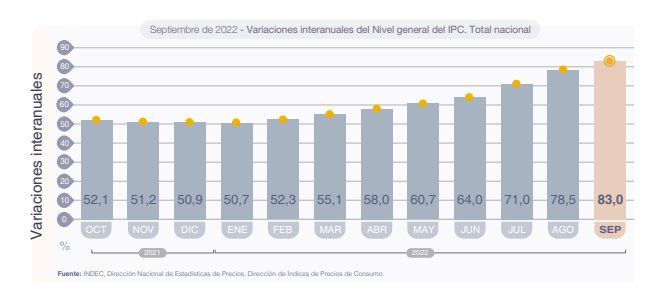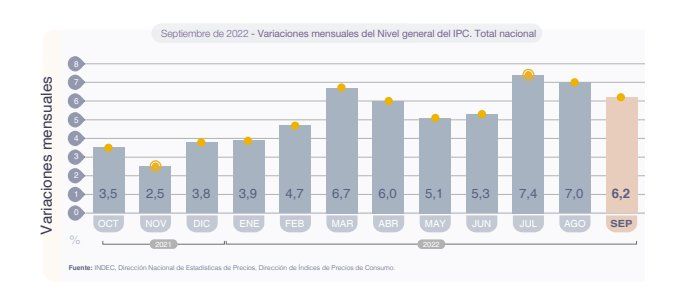indec inflates.PNG
He explained that during September, the wage increase of workers in private homes also stood out -which had an impact on Home equipment and maintenance (6%)–as well as the rises in public transport fares –underground, taxi, air, among others– and the drag left by the increase in fuel prices at the end of August, which impacted the division Transportation (5.8%).
the rise of Food and non-alcoholic beverages (6.7%) it was what had the most impact in all the regions, within which the increase in Vegetables, tubers and legumes stood out; Oils, fats and lard; and fruits.
inflated YoY.PNG

At the category level, it led the monthly rise Seasonal (11.7%) –explained, in part, by the aforementioned rises in Garments, Vegetables, tubers and legumes, and Fruits– followed by the Core CPI (5.5%) and finally, Regulated (4.5%).
monthly inflates.PNG

“Monthly inflation for September was 6.2%, lower than the consensus estimate. Even so, the data is lousy: the interannual reached the maximum since ’91 and annualized gives 106%“, said John Paulicchieconomist at Empiria Consultores.
To its turn, Claudio Caprarulofrom Analytica, told Ambit that in the margin the inflation figure is better than expected.
“We continue at very high rates but mainly the drop in core inflation -represents 68% of the prices of the economy- to 5.5% after having reached 7.3% in July and 6.8% in August understand the importance of expectations“, he highlighted.
And he added: “Stabilizing the exchange rate gap, even at very high values, and with better coordination of economic policy, some green shoots were seen. For October, the situation is once again very difficult because the Central Bank is selling dollars again and the pressure on the dollars together with the updating of many rates is going to generate higher inflation.“.
According to the Survey of Market Expectations, carried out monthly by the Central Bank, inflation in September would have reached 6.7%, while analysts forecast 100.3% for the entire year.
The president of the Central Bank, Miguel Angel Pesceaffirmed last week that it is possible to comply with the 60% inflation guideline contemplated in the 2023 Budget project, because for next year “an external shock is not expected nor are sudden changes in the exchange rate expected“.
“That’s why we believe there will be a slowdown in inflation“, said the head of the Central this afternoon when presenting at a meeting of the Budget Commission of the Chamber of Deputies, in which the project sent by the Executive Power was analyzed.
Meanwhile, the Minister of Economy, Serge Massasaid this Friday that the estimates indicate that inflation will “go back down significantly” and maintained that it was raised “a path of downward travel, gradual, serious, firmto deal with rising prices.
“Today in the afternoon the inflation data will be known, our estimates are that inflation will drop significantly again“, Massa pointed out when speaking in Washington DC, United States, at the Atlantic Council under the title “Argentina’s economic prospects in 2023”.
In this sense, he affirmed that “in order to lower inflation, Argentina requires a path to follow, of a fiscal order, of a commercial surplus, of taking care of its reserves, of an interest rate that increases the interest of Argentine savers to have operations in pesos.
“It is not that someone can magically solve a problem that is also structural and that we are seeing all over the world, in Argentina very aggravated,” he remarked.
The inflation it is estimated that will not drill 6% in the last months of the year. Food, for its part, grew above the general level of prices. According to private consultants, this happened in September and would happen again in October. In fact, some surveys already report strong increases in this item in the first days of the month.
They also warn that, due to the escalation of inflation, mass consumption fell by 9.9% in September Compared to the same month last year and in the first nine months of the year, the contraction reaches 3.5% against the same period in 2021.
As Ámbito learned, the Minister of Economy, Serge Massa, has planned “begin to convene businessmen and trade unionists to agree on a gradual path to reduce prices and wages,” after the efforts made this week in the United States.
Source: Ambito
David William is a talented author who has made a name for himself in the world of writing. He is a professional author who writes on a wide range of topics, from general interest to opinion news. David is currently working as a writer at 24 hours worlds where he brings his unique perspective and in-depth research to his articles, making them both informative and engaging.




